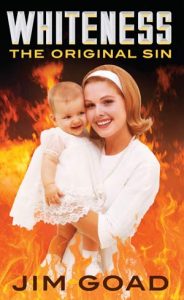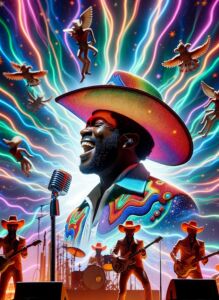Reclaiming Country Music’s Imaginary Black Roots
Posted By Jim Goad On In North American New Right | 57 CommentsMusic superstar Beyoncé Knowles — who has sold over 200 million records, won more Grammy Awards than anyone in history, and recently became the first black woman to score a #1 single on Billboard’s Hot Country Songs chart, all while politicking for Black Lives Matter, the Black Panthers, and all things black — is actually a mixed-race mudpuppy descended from a white slaveowner [2].
It’s a well-kept secret that only a tiny minority of white Americans ever owned slaves, so if you believe in idiotic voodoo superstitions such as inherited generational guilt, it’s possible that Beyoncé has more blood on her hands for black slavery than I do.
Audio version: To listen in a player, use the one below or click here [3]. To download the mp3, right-click here [3] and choose “save link/target as.”
https://counter-currents.com/wp-content/uploads/2024/04/Goad-ReclaimingCountryMusicsImaginaryRoots.m4a [3]Released last Friday, Beyoncé’s new album Cowboy Carter [4] — whose cover [5] features the singer posed as a rodeo queen riding sidesaddle on a horse — is being feted as a long-overdue acknowledgment of black Americans’ seminal contributions to country music that have long been buried by a toxically racist culture that seeks to ignore black accomplishments at every turn rather than, oh, exaggerate them to spare black feelings and amplify white guilt.
Cowboy Carter is a concept album — concept albums were conceived by white Brits such as The Who [6], The Beatles [7], and Pretty Things [8] in the late 1960s — meant to emulate a broadcast by an imaginary station called “KNTRY Radio Texas.” It features guest spots by well-known white country artists Willie Nelson and Dolly Parton, as well as the super-obscure 1960s black country singer Linda Martell, all posing as disc jockeys in between musical tracks. It spotlights a ghettoized, bitch-I’m-a-kill-you version of Dolly’s song “Jolene” and a culturally appropriated version of The Beatles’ song “Blackbird” featuring Paul McCartney on guitar. “Blackbird” was chosen, I’m assuming, because it has the word “black” in the title.
I was able to bring myself to listen to most of Cowboy Carter, and hardly any of it sounded like country music to me. But ever since its leadoff single “Texas Hold ’Em” was released during the Super Bowl on February 11, mainstream media outlets have been pummeling us with the concept that country music has always been black music, and it’s about fucking time we realized it.
In an article for TIME this past February called “Beyoncé Has Always Been Country [9],” a black woman named Taylor Crumpton [10] writes:
The greatest lie country music ever told was convincing the world that it is white. . . . The truth is that country music has never been white. Country music is Black [sic]. Country music is Mexican. . . . One of the biggest lies this nation has ever told is that Black [sic] people are not country. That they do not live in “small towns,” despite what Jason Aldean says.
Actually, Crumpton told a huge and easily disproved lie right there. In the lyrics [11] to his infamous 2023 song “Try That in a Small Town,” Jason Aldean never once mentions race. I’m depressingly unsurprised that TIME’s fact-checkers let that one slip past them.
In March, National Geographic — which I remember from my childhood as the only magazine you could find in a dentist’s office that showed tits, although those of African tribeswomen — published an article called “How Black [sic] artists helped make country music what it is today [12]”:
Black folks have been writing, performing, and recording country music since it first became popular in the 1920s. In fact, country music wouldn’t exist as it does today without the contributions and innovations of Black [sic] musicians.
The article says that the Carter Family, the “First Family of Country Music,” had been heavily influenced in the 1920s by a black man named Lesley Riddle, but riddle me this: How black does he look to you? [13] It also claims that a black man named Rufus “Tee Tot” Payne [14] taught Hank Williams [15], who’s probably the most towering figure in country-music history, how to play guitar. But “Tee Tot” didn’t teach “The Hillbilly Shakespeare” how to sing, nor how to write country songs.
 [16]
[16]You can buy Jim Goad’s Whiteness: The Original Sin here [17].
Speaking of hillbillies, the article also sidesteps the fact that when white Appalachians such as the Skillet Lickers stepped out of the foggy mountains in the 1920s long enough to record their unique strain of moonshine-addled and fiddle-driven folk music onto wax, it was marketed as “hillbilly music” rather than “country” or “western” music.
On Monday, Salon profiled Cowboy Carter guest star Linda Martell [18], hyperbolically calling her a “pioneering country artist” who had an “everlasting impact on country music” and “country’s first Black [sic] superstar” whose career was stymied by the toxic stench of white racism. The article implied that Martell’s record company, the inconveniently named Plantation Records, shoved Martell out of the way in favor of “a white artist, Jannie [sic] C. Riley.”
In the real world, the “superstar” Martell’s biggest-charting song was 1969’s “Color Him Father,” which peaked at #22 on the Billboard Country charts and never cracked the regular charts. Her 1970 Color Me Country album peaked at #40 on the Billboard Country charts. The only thing she “pioneered” in country music was being a Negress. There was nothing innovative or unique about her music.
On the other hand, Jeannie C. Riley [19], besides being possibly the most attractive female country singer of all time, scored six Country Top Ten singles as well as a #1 hit on the general Billboard charts with “Harper Valley PTA [20],” but perish the thought that she was simply more talented than Linda Martell. Shucks, let’s make everything about black power and white guilt.

Last Friday, Kamala Harris, the Jamaican/Indian hybrid who’s perched only a heartbeat away from the presidency, tweeted [21]:
Beyoncé: Thank you for reminding us to never feel confined to other people’s perspective of what our lane is. You have redefined a genre and reclaimed country music’s Black [sic] roots.
Your music continues to inspire us all.
Beyoncé: Thank you for reminding us to never feel confined to other people’s perspective of what our lane is. You have redefined a genre and reclaimed country music’s Black roots.
Your music continues to inspire us all.
— Vice President Kamala Harris (@VP) March 29, 2024 [22]
When in the name of Mister Bojangles has anyone ever forbidden black people from playing country music?
Depending on which page you consult, Wikipedia says that Charley Pride [23] — a black man from Sledge, Mississippi who played Negro League Baseball and worked at a smelting furnace in Helena, Montana before he started recording country songs in the mid-1960s — either had 29 [24] or 30 [23] songs that hit #1 on Billboard’s Hot Country Songs chart, which is more than either Willie Nelson or Dolly Parton ever had. The only solo country performers who notched more #1 singles than Charley Pride were George Strait (44), Conway Twitty (40), and Merle Haggard (38). Five freaking decades ago, country music fans were so vehemently and virulently racist that they bought 70 million Charley Pride albums and selected him 1971 Entertainer of the Year at the Country Music Association Awards. The last time I saw my paternal uncle, Carlton Goad — AKA Uncle Carty — up in Vermont’s Appalachian hills, he had a Charley Pride 8-track tape in his Winnebago camper.
Along with harmonica player DeFord Bailey and Darius Rucker (formerly “Hootie” of “Blowfish” infamy), Charley Pride was one of only three blacks out of 226 performers who became members of the Grande Ole Opry [25]. Dare we ponder the terrifying possibility that there have never been many black people, who’ve always enjoyed tremendous success in the American music industry, who even wanted to play country music?
By the way, when are we going to see an onslaught of articles about how Wayne Cochran [26] and Roy Head [27] were written out of the soul-music history books?
The racial revisionists have even invaded Wikipedia’s page on country music [28], alleging that:
The history of country music is complex, and the genre draws from influences from both African [29] and European musical traditions.
Notice how they put “African” before “European”?
In June of 2020, as the Summer of Floyd raged, two multimillion-selling white country groups — Lady Antebellum and the Dixie Chicks — changed their names to Lady A [30] and The Chicks [31] to disassociate themselves from the old white South that gave birth to country music.
Though it may be a bitter pill for many to swallow, black Americans have always appropriated the English language and technology invented by white people to make records.
No one has ever ignored blacks’ piddling influence on country music. But what’s happening now is that they’re killing whites’ ability to claim it as white music. They won’t stop until there is nothing — even something as innately white as country music — left that white people can claim exclusively for themselves.
Well, everything except “racism.”
 [32]
[32]
